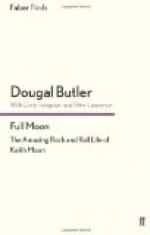He sat now, with a kind of sombre thoughtfulness, listening to Mr. Brimsdown’s account of his first meeting with his dead client. That story carried with it a suggestion of adventure and mystery, but it was difficult to say whether those elements had anything to do with Robert Turold’s death, thirty years later. It brought up the image of a man, rugged and dominant even in youth, winning his way into the heart of a middle-aged lawyer by the story of his determination to possess an old English title. Most men have the spirit of Romance hidden in them somewhere, and chance or good luck had sent Robert Turold, on his return to England, to the one solicitor in London to whom his story was likely to make the strongest kind of appeal. The spirit of Romance in Mr. Brimsdown’s bosom was no shimmering thing of thistledown and fancy, but took the concrete shape of the peerage law of England, out of which he had fashioned an image of worship to the old nobility and the days of chivalry.
Barrant gathered so much from the lawyer’s description of that first meeting. And if Robert Turold had found in the solicitor the man he most needed in his search for the missing title, it was equally clear that his own great quality of rugged strength had exercised the most extraordinary sway on the lawyer—a species of personal magnetism which had never lost its original effect. It was not until the second or third meeting—Mr. Brimsdown was not quite sure which—that the question of money was introduced. The lawyer had pointed out to his client that the search for the title was likely to be prolonged and expensive, and Robert Turold had indifferently assured him that he had money at his command for that purpose lying on deposit at a London bank. The amount, when he did mention it, was much greater than Mr. Brimsdown imagined—nearly L50,000 in fact. It was at Robert Turold’s suggestion that Mr. Brimsdown undertook to invest the sum at better rates of interest, and thus, before a year had passed, the whole of Robert Turold’s business affairs were in the hands of the solicitor.
On one point Mr. Brimsdown was clear. He had never heard from Robert Turold how he first came into possession of this large sum of money, and his client had never encouraged inquiry on the subject. Mr. Brimsdown had once ventured to ask him how he had made his fortune, and Robert Turold, with a freezing look, had replied that he had made it abroad. Mr. Brimsdown had never again referred to the subject, deeming it no business of his.
Barrant, listening to this with the air of a man who was not to be deceived, could not see that the narration threw any illumination on the letter or the other circumstances of Robert Turold’s death. It seemed too far-fetched to suppose there was any connection between the fortune which Robert Turold had brought from abroad thirty years before and the letter he had sent to his solicitor on the night of his death. The idea did indeed cross his mind that some iniquity in that money-getting may have been responsible for a belated revenge, but he dismissed that thought as too wide for the scope of his inquiry. Abroad! That was a vague word, and thirty years was a long while back.




